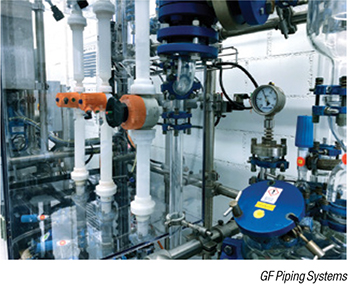Safe and reliable transport for aggressive chemicals
 This company has expanded upon its proven line of SYGEF fluoropolymer piping solutions with ECTFE (ethylenechlorotrifluoroethylene), a copolymer of ethylene and chlorotrifluoroethylene, for extreme chemical applications. When materials such as polypropylene (PP), polyethylene (PE), polyvinylchloride (PVC), chlorinated PVC (CPVC) or polyvinylidene fluoride (PVDF) have reached their limits with aggressive chemicals, ECTFE is the most effective option. The high chemical resistance of ECTFE allows it to safely transport bases and highly concentrated acids, even when pH values are lower than 2 or higher than 12. Meanwhile, ECTFE’s mechanical properties allow it to handle pressures up to 150 psi and temperatures up to 176°F when transporting aggressive chemicals. The company ensures the reliability of ECTFE systems through its use of advanced infrared (IR) welding technology. Fusion welding machines join the components in a consistent, repeatable, and documented manner, so that ECTFE systems offer the highest quality of piping systems. In addition to being a high-performance solution for aggressive chemicals, ECTFE is also a cost-effective system. Installation is up to 85% faster than for a comparable system of lined steel, and initial costs for an ECTFE system are typically 50% lower than they would be for IR-welded perfluoroalkoxy alkanes (PFA), the company says. The high chemical resistance of ECTFE also means lower maintenance costs, fewer process interruptions and a longer operational lifespan. — GF Piping Systems, Irvine, Calif.
This company has expanded upon its proven line of SYGEF fluoropolymer piping solutions with ECTFE (ethylenechlorotrifluoroethylene), a copolymer of ethylene and chlorotrifluoroethylene, for extreme chemical applications. When materials such as polypropylene (PP), polyethylene (PE), polyvinylchloride (PVC), chlorinated PVC (CPVC) or polyvinylidene fluoride (PVDF) have reached their limits with aggressive chemicals, ECTFE is the most effective option. The high chemical resistance of ECTFE allows it to safely transport bases and highly concentrated acids, even when pH values are lower than 2 or higher than 12. Meanwhile, ECTFE’s mechanical properties allow it to handle pressures up to 150 psi and temperatures up to 176°F when transporting aggressive chemicals. The company ensures the reliability of ECTFE systems through its use of advanced infrared (IR) welding technology. Fusion welding machines join the components in a consistent, repeatable, and documented manner, so that ECTFE systems offer the highest quality of piping systems. In addition to being a high-performance solution for aggressive chemicals, ECTFE is also a cost-effective system. Installation is up to 85% faster than for a comparable system of lined steel, and initial costs for an ECTFE system are typically 50% lower than they would be for IR-welded perfluoroalkoxy alkanes (PFA), the company says. The high chemical resistance of ECTFE also means lower maintenance costs, fewer process interruptions and a longer operational lifespan. — GF Piping Systems, Irvine, Calif.